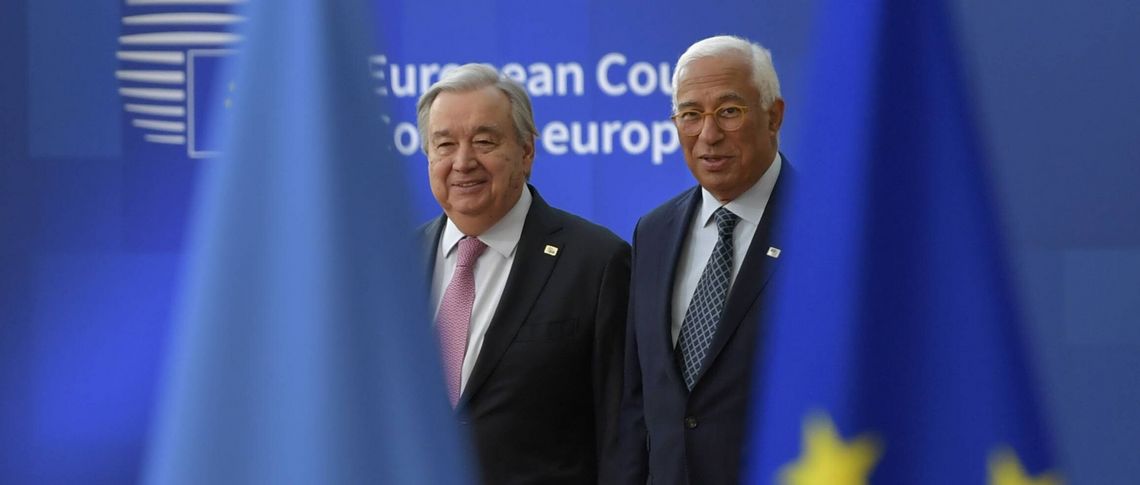As the world drifts into disorder, the foundations of global cooperation are eroding. The rules-based international order – once anchored in robust multilateral institutions and US leadership – is under siege from rising authoritarianism, intensifying rivalry and renewed military aggression. With the US stepping back and conflicts escalating, the order’s future depends on whether others will uphold it.
This instability is also undermining progress on the 2030 Agenda for Sustainable Development — from ending poverty to advancing peace. In this context, the EU must lead, invest and engage with all its partners – whether like-minded or not – to uphold multilateralism and reinforce global stability.
Europe’s security depends not only on defence but also on sustainability worldwide — the bedrock of lasting peace. The UN Pact for the Future affirms the indivisibility of sustainable development, peace and human rights — a principle echoed by Secretary-General António Guterres, who told the Security Council: ‘Sustainable peace requires sustainable development.’
Three interrelated challenges
As China, Russia and even the United States challenge the rules-based international order – despite serving as permanent members of the UN Security Council – the EU must respond by forging more resilient, inclusive partnerships. Central to this effort is the EU’s engagement with the Global South — a diverse group of countries united more by shared concerns than geography. Many of these states perceive the international order as biased toward Western interests, a view shaped by the persistent gap between ambitious global commitments – especially the Sustainable Development Goals (SDGs) and reforms to global governance – and the limited progress in realising them, including reforms of the UN Security Council. Given its rising influence, the Global South is indispensable to any effort to restore and sustain international stability.
Against this backdrop, the EU and its partners must address three interrelated challenges:
First, restoring momentum behind the Sustainable Development Goals (SDGs) must be a top priority. The credibility of the UN hangs in the balance. Backed by the EU, the UN has often reaffirmed the SDGs’ importance — yet with 2030 approaching, only 17 per cent of the goals are on track.
The EU should initiate internal consultations and propose a roadmap for a post-2030 sustainable development framework.
But 2030 is not the end — it is a key milestone on a longer journey. The Pact for the Future mandates that the UN’s High-Level Political Forum on Sustainable Development assess, in September 2027, how to advance sustainable development by 2030 and beyond. This calls for a dual focus: intensifying efforts to achieve the current goals while laying the groundwork for a post-2030 global agenda.
The EU and its Member States – which give 42 per cent of global official development assistance (ODA) and (mostly) remain committed advocates of multilateralism – should articulate their position early to shape this process. Notably, however, European Commission President Ursula von der Leyen’s mission letter to Commissioner Jozef Síkela makes no reference to sustainable development beyond 2030 — even though it falls within the Commission’s 2024–2029 mandate. To that end, the EU should initiate internal consultations and propose a roadmap for a post-2030 sustainable development framework. This work can build on an evaluation commissioned by the European Commission, which examined how EU external action contributed to the SDGs between 2016 and 2021. Preparations must begin now.
Moreover, translating the Pact for the Future into measurable outcomes is essential. The EU and its partners must help ensure the effective implementation of the commitments it enshrines.
A second, related challenge is financing for development. As Spain gets ready to host the Fourth International Conference on Financing for Development (30 June – 3 July 2025), a sobering reality emerges: new ODA commitments are unlikely to be forthcoming. The US has slashed its aid and, like other donors – including the EU – is prioritising the effective use of existing instruments, including those that leverage private sector investment.
The world spends more on war than on peace.
According to the OECD, the annual financing gap for achieving the SDGs stands at $4 trillion and could rise to $6.4 trillion by 2030. In stark contrast, global military spending reached a record $2.7 trillion last year and continues to grow. This contrast underscores a hard truth: the world spends more on war than on peace. The EU must therefore intensify efforts to foster the conditions for peace — including by advancing sustainable development and supporting resilient societies.
Although the EU, like other donors, will not pledge new ODA in Seville, alternative approaches have emerged. These include shifting the focus from mobilising funds to improving spending impact; reallocating IMF Special Drawing Rights; advancing global tax cooperation; phasing out harmful subsidies; and expanding blended finance. Some of these approaches already have EU backing.
Individually, the approaches might fall short — but collectively, they show growing political will. Ignoring them would signal resignation to the status quo.
Third, as development cooperation becomes increasingly shaped by political priorities, the EU must clarify what its development policy is meant to achieve — and how it should evolve in today’s global landscape. A prominent example is the Global Gateway Initiative, positioned as an economic, social and environmental alternative to China’s Belt and Road Initiative.
Yet, pressing questions persist: Can the fight against poverty continue amid competing demands such as climate action and support for Ukraine? How can these priorities be integrated to deliver cohesive outcomes? What innovative solutions can help bridge the gap? Are current instruments fit for purpose? And how can development cooperation adapt amid intensifying geopolitical tensions and tightening budgets?
Without clear answers, the EU risks losing even more credibility in the Global South.
Forging more resilient, inclusive partnerships
Adapting EU development policy to the Global South’s rising influence is a strategic necessity. As such, the EU is moving past donor–recipient models towards building balanced, interest-based partnerships. A key example is the Samoa Agreement, signed in November 2023 with 79 African, Caribbean and Pacific countries, which promotes joint action on shared priorities, including sustainable development.
While these priorities are pressing in the Global South, they also reflect broader EU ambitions for strengthened global cooperation. The EU must deepen partnerships worldwide to advance shared objectives: reforming multilateral institutions, upholding international law, addressing climate change, protecting oceans and eliminating poverty.
Progress on these three priorities – accelerating the SDGs, closing the financing gap and redefining development cooperation – is vital for global stability, as well as for safeguarding and modernising multilateralism in a changing world. Reform is needed to restore its legitimacy and performance. This moment calls for more than alignment — it demands leadership, particularly as others retreat. The EU and its partners must act with clarity and conviction, working alongside the Global South to build a fairer, more resilient international order.
The task is daunting, but drift is not an option. If others step back, the EU must lead — not by default, but by design.






